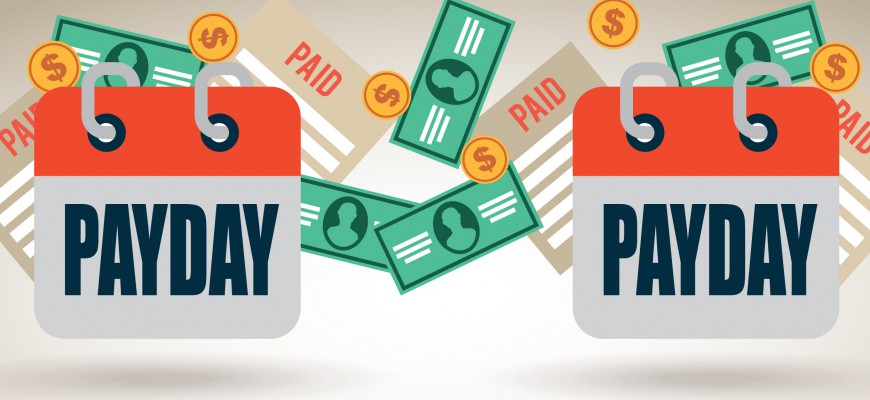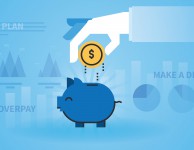How To Stop Living Paycheck To Paycheck
 Saving money can be difficult, especially when your expenses seem overwhelming. According to a survey by GoBankingRates, money concerns weigh on the mind of a majority of Americans, as one-quarter of respondents were primarily worried about finances. When you are living paycheck to paycheck, it’s hard not to think about your account balance.
Saving money can be difficult, especially when your expenses seem overwhelming. According to a survey by GoBankingRates, money concerns weigh on the mind of a majority of Americans, as one-quarter of respondents were primarily worried about finances. When you are living paycheck to paycheck, it’s hard not to think about your account balance.
However, with a little self-discipline and strategy, saving money won’t seem as daunting. It all starts with your paycheck. If you are like the majority of Americans, you get paid bi-weekly, or every other week, according to the U.S. Bureau of Labor Statistics. The first step in beginning to save money is to have a plan for your paychecks.
Make Money, Save Money
It is important to make sure that, at the end of the day, there is enough money left over from your take-home pay to afford essentials such as food, heat and rent. However, Get Rich Slowly, a personal finance blog, explained that before you pay your bills each month, there is someone more important you must pay: your future self. After allocating the necessary funds to bills and expenses, be sure to set aside a portion of the rest of your paycheck toward some kind of saving strategy.
There are several ways to put money away and save long term. A savings account is usually the most popular method. Most employers’ payrolls support dividing a paycheck into multiple accounts for direct deposit. If your paycheck is currently going solely into a checking account, elect to set aside a portion of the funds to go into a savings account. Even the smallest amount could make a huge difference.
This money could be used as an effort to save for something specific, like a house or vacation. Or it could be an emergency fund in case something happens and extra money is needed to pay off expenses. Either way, knowing this money is safely set aside can ease the minds of many who are worried about their month-to-month expenses.
Get Rich Slowly also advised taking advantage of a 401(k) plan if it is offered by your employer, especially if the employer offers a match. This means that every time you put a percentage of your paycheck into the 401(k), your employer contributes the same amount, up to a certain point. Even if you only put a small amount toward your 401(k), after some time, this money will add up due to compounding interest. Plus, according to CNN Money, your 401(k) won’t be taxed until you begin to use the funds. When you retire, this money is all yours to help with any expenses you have.
Pay The Bills
While paying yourself is important, it’s no secret that your cable company or landlord believe they are pretty important payees as well. Make sure you know the amount of money you need to allocate to pay the bills. Some will be fixed, like rent or a fixed-rate mortgage, while others may fluctuate, such as electricity or grocery expenses. Estimate how much you will need every month and set this aside.
Keith Klein, a certified financial planner at Phoenix-based Turning Pointe Wealth Management, told BankRate he recommends having a separate checking account solely dedicated to paying bills and living expenses. This way, it will be harder to splurge on something unnecessary, since there is just enough for living expenses and not enough for frivolous purchases. At the end of the month, assess how close your estimate was and adjust if needed. If you needed to take money from another account to make ends meet, raise the allocation. However, if there is money left over, move it to your savings account and readjust the amount of money dedicated to the bill-paying checking account.
Compare and Contrast
Once you know how much you need to get by in a month, you can see how much money you are putting toward groceries, electricity, heating and other expenses that don’t have fixed amounts. Focus on lowering these bills by making some lifestyle changes.
The Simple Dollar suggested creating a grocery list before going to the store. Making the list in accordance to the grocery store’s coupon cycle can save money as well. For instance, if bread can be purchased at a discount one day, buy extra and freeze one of the loaves. Freezing food also saves money when you cook large batches of a meal, such as spaghetti sauce or lasagna. Freeze them, then take them out when they are needed.
Cable bills can be reduced by cancelling some of the extra channels if you never watch them. Electricity bills can also be reduced by practicing some energy conservation best practices, such as always remembering to turn off the lights, television and other appliances when you aren’t using them. Energy-efficient light bulbs can also reduce electricity bills in the long run.
Take in account these tips when you are budgeting yourself each and every month and you’ll see yourself worrying about your finances less and less.
Want to get more tips about budgeting delivered straight to your inbox? Subscribe to our email list!






